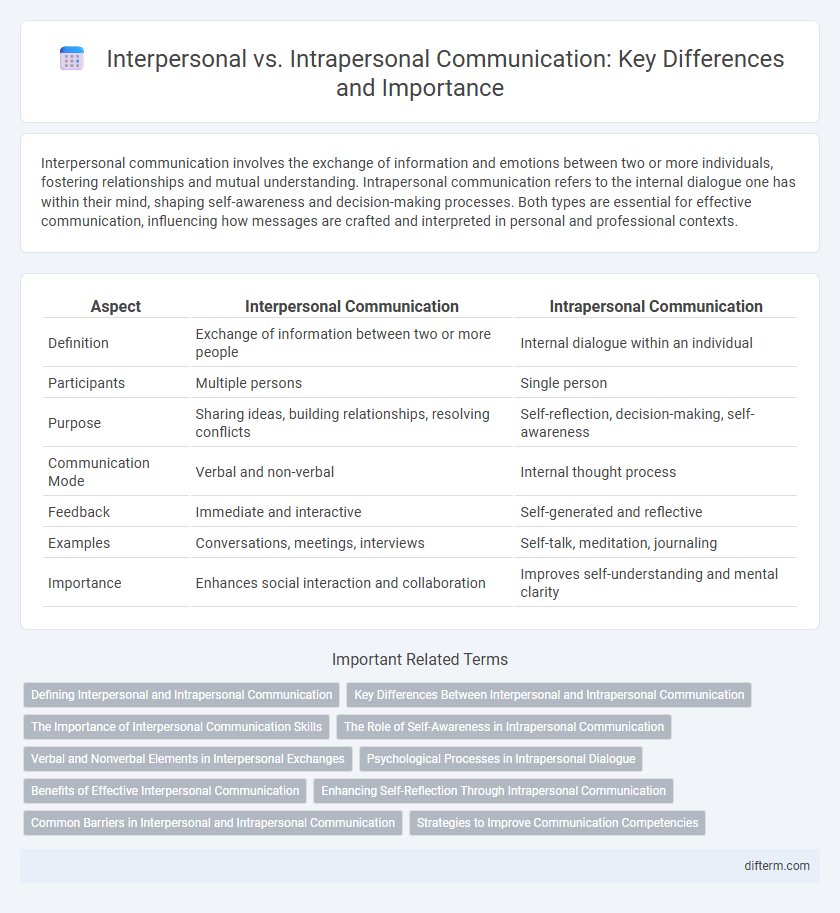Interpersonal communication involves the exchange of information and emotions between two or more individuals, fostering relationships and mutual understanding. Intrapersonal communication refers to the internal dialogue one has within their mind, shaping self-awareness and decision-making processes. Both types are essential for effective communication, influencing how messages are crafted and interpreted in personal and professional contexts.
Table of Comparison
| Aspect | Interpersonal Communication | Intrapersonal Communication |
|---|---|---|
| Definition | Exchange of information between two or more people | Internal dialogue within an individual |
| Participants | Multiple persons | Single person |
| Purpose | Sharing ideas, building relationships, resolving conflicts | Self-reflection, decision-making, self-awareness |
| Communication Mode | Verbal and non-verbal | Internal thought process |
| Feedback | Immediate and interactive | Self-generated and reflective |
| Examples | Conversations, meetings, interviews | Self-talk, meditation, journaling |
| Importance | Enhances social interaction and collaboration | Improves self-understanding and mental clarity |
Defining Interpersonal and Intrapersonal Communication
Interpersonal communication involves the exchange of messages between two or more individuals, focusing on interaction and relationship-building through verbal and nonverbal cues. Intrapersonal communication refers to the internal dialogue within an individual, encompassing self-reflection, decision-making, and emotional processing. Both forms are essential for effective communication skills, influencing personal understanding and social connectivity.
Key Differences Between Interpersonal and Intrapersonal Communication
Interpersonal communication involves the exchange of information between two or more individuals, emphasizing verbal and nonverbal cues such as tone, facial expressions, and body language. Intrapersonal communication refers to the internal dialogue within oneself, including self-reflection, decision-making, and personal thought processes. Key differences include the external nature of interpersonal communication requiring interaction with others, versus intrapersonal communication being an internal, self-generated process essential for self-awareness and cognitive evaluation.
The Importance of Interpersonal Communication Skills
Interpersonal communication skills are essential for building strong relationships and fostering collaboration in both personal and professional environments. Effective verbal and nonverbal exchanges enhance understanding, reduce conflicts, and promote emotional intelligence. Mastery of these skills directly contributes to improved teamwork, problem-solving, and overall social well-being.
The Role of Self-Awareness in Intrapersonal Communication
Self-awareness enhances intrapersonal communication by allowing individuals to recognize and regulate their thoughts, emotions, and motivations, leading to clearer self-reflection and decision-making. This internal dialogue fosters emotional intelligence, which is crucial for managing stress and improving problem-solving skills. Developing self-awareness ultimately strengthens personal growth and resilience through more mindful and intentional self-interactions.
Verbal and Nonverbal Elements in Interpersonal Exchanges
Verbal and nonverbal elements play crucial roles in interpersonal communication, where spoken words convey explicit messages while body language, facial expressions, and tone provide contextual meaning. Intrapersonal communication, by contrast, primarily involves internal verbal thought processes and mental imagery, with no observable nonverbal cues. Understanding the synergy of verbal and nonverbal signals enhances accuracy and depth in interpersonal exchanges.
Psychological Processes in Intrapersonal Dialogue
Intrapersonal dialogue involves complex psychological processes such as self-reflection, self-regulation, and cognitive restructuring that occur within an individual's mind. These processes enable individuals to analyze experiences, manage emotions, and develop problem-solving strategies, enhancing self-awareness and emotional intelligence. Unlike interpersonal communication, which requires interaction between multiple people, intrapersonal communication centers on internal thought patterns that influence decision-making and personal growth.
Benefits of Effective Interpersonal Communication
Effective interpersonal communication enhances relationship building by fostering trust, understanding, and collaboration among individuals. It improves conflict resolution skills, enabling timely and constructive feedback that minimizes misunderstandings. The development of empathy and active listening in interpersonal communication contributes to stronger social connections and overall emotional well-being.
Enhancing Self-Reflection Through Intrapersonal Communication
Intrapersonal communication, the internal dialogue individuals engage in, significantly enhances self-reflection by promoting deeper awareness of thoughts, emotions, and motivations. This reflective process allows individuals to evaluate personal experiences and behaviors critically, leading to improved decision-making and emotional regulation. Strengthening intrapersonal communication skills fosters greater self-understanding and resilience, which subsequently enriches interpersonal interactions.
Common Barriers in Interpersonal and Intrapersonal Communication
Common barriers in interpersonal communication include misunderstandings, emotional interference, and cultural differences that distort message clarity. Intrapersonal communication often faces obstacles such as negative self-talk, cognitive biases, and lack of self-awareness which impede effective internal processing. Recognizing these barriers is essential for improving both external interactions and internal thought clarity.
Strategies to Improve Communication Competencies
Developing active listening skills enhances both interpersonal and intrapersonal communication by promoting better understanding and self-awareness. Practicing empathy and reflective thinking refines emotional intelligence, crucial for interpreting others' messages and managing internal responses effectively. Utilizing feedback mechanisms and mindful articulation strengthens clarity and reduces misunderstandings in diverse communicative interactions.
interpersonal vs intrapersonal Infographic

 difterm.com
difterm.com